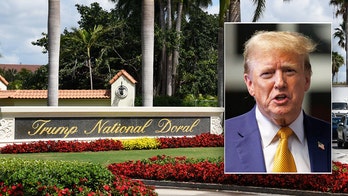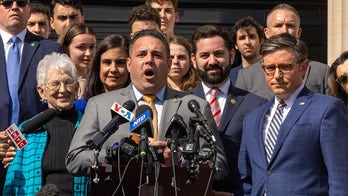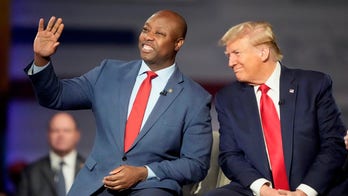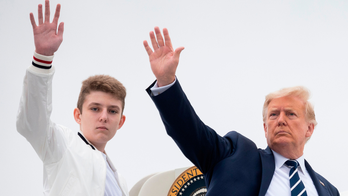Before I begin, please let me ask a favor. And the request comes in the form of a demand, maybe even an order.
Take a moment to ponder and savor the majestic historical break-through this debate represents. Longer. Longer. Let it soak in. Just take a moment longer.
OK.
Now, ask yourself this question: when you first became politically aware did you ever imagine a presidential debate of this magnitude and importance involving a woman and an African-American man?
I was born in 1962 and can tell you I first became politically aware when Robert Kennedy and Martin Luther King Jr. were assassinated. I didn't know what it all meant, but I knew it was serious and sad. Like everyone, I was afraid our country had been changed forever and for the worse. I can't help tonight but think back to the vague sense of dread I had about politics then and reflect tonight so many years later on the true nature of persistence and possibility.
I've watched politics as a journalist, I have come to understand the power of symbols and how symbols often obscure agendas. But sometimes symbols shatter old notions, accepted truths, and calcified conventions.
Tonight's debate -- whether you are a liberal, a conservative, or an independent -- stands as a landmark in a nation that justifiably commands the attention and fascination of the world.
With Sen. Hillary Clinton and Sen. Barack Obama as the two remaining Democratic candidates for the presidency, the world sees the embodiment of core American traits of freedom, tolerance, diversity, grit and, yes, audacity.
This is not an endorsement of either candidate. It's an acknowledgment that their rise to dominance in the Democratic Party breaks the mold in ways few could have imagined as recently as two years ago. When America, the most imaginative nation on Earth, surprises itself we must catch our breath, marvel at ourselves and indulge in a small blush of pride.
I can tell you the reason I am rhapsodizing about this moment. Here in the press room outside the Kodak Theater in Los Angeles, many in press row are bored. On a typical debate scale, this encounter is not an edge-of-your-seat affair. The debate is certainly calmer and more substantive than the Myrtle Beach knife fight. That's to be expected, because politicians are normatively cautious and any two politicians taking part in something THAT'S NEVER BEEN SEEN BEFORE are even more prone to proceed with care.
And so Clinton and Obama did.
And yet, the debate was not without its high points.
I won't grade the debate or the performances because tonight the larger issue is the event itself and what it represents. History will record the tableau, not the transcript.
Clinton and Obama dissected each other's health care plans carefully and fairly. Clinton knows, because she believes in it and the polls reflect it, that pushing hard for universal health care is the way to appeal bedrock Democratic values and voters. When she said anything less will be "picked apart" she not only issued a warning but rallied party foot-soldiers who don't want to fight for a concept, but an absolute.
This is not to say that Obama lost the health care debate. The voters will decide which approach is better. Whn Obama argues the first priority is to lower costs, he raises an important but politically less-resonant point. His formula takes longer to explain and exposes him to criticism that his plan is built on a fragile foundation where an estimated 15 million adults would still lack health insurance coverage. Based on conversations I've had with voters, however, it seems that if Obama loses ground on substance he makes it up on style. Obama voters and those on the fence tend to believe that a larger political coalition is required before universal health care or something close to it can be achieved. They also tend to believe Obama can create that coalition and Clinton cannot.
On Iraq, it's hard for The Bourbon Room to detect a tectonic shift tonight (hey, I was born in San Diego and can indulge in one earthquake metaphor without penalty). Most Democratic voters understand Clinton and Obama will end the Iraq war more rapidly than any Republican nominee, especially if the nominee is, as appears more and more likely, Arizona Sen. John McCain. Obama supporters were drawn to him first because he opposed the war from the start. When Clinton declined again to say her vote for the Iraq war authorization was a "mistake" she re-enforced why many Obama supporters are where they are. In Super Tuesday states where some voters may be tuning into the campaign for the first time, this could reintroduce the central weakness in Clinton's "experience" argument. Clinton strategists, however, believe she's already lost all the votes she's going to lose on this issue.
On the economy, differences were substantive but not remotely combative. Obama could have used his stump speech lines about Clinton's original stimulus plan failing to demand tax rebates or credits. Clinton could have said she was warning about a recession long before Obama and put together the first substantive stimulus plan of any major candidate. Both left that ammunition under the table.
On immigration, the most important point is that both were far more willing to talk freely about comprehensive solutions. The reason? The rise of McCain. On driver's licenses, the differences were gently highlighted and both scored a key point -- Obama that Clinton flip-flopped; Clinton that a week after the Philadelphia debate Obama couldn't authoritatively state his position. More important was how they enthusiastically spoke of a comprehensive solution and how readily they condemned the "anti-amnesty" politics that killed immigration reform (and nearly McCain's candidacy) earlier this year. The change in tone and temperament matches McCain's own improbable comeback. Clinton and Obama have begun to conclude that the immigration monster either will die because will be the GOP nominee or that it will be relegated to angry third-party splinter movement (a plus for the Democrats either way).
On the running-mate issue, both turned it away easily and for good reason. At the end of this campaign Clinton and Obama will stand as enormous figures -- not only in their party but in American political history. If Clinton prevails, she will seek a vice president with complementary skills, temperament and, most importantly, a keen understanding of the lesser role the vice president must play in her White House. The same is true of Obama.
Why?
Because if either is elected president, all of the old measurements will disappear. Every move Clinton or Obama makes will be historic. The focus on their presidencies will be, if possible, even more intense, personal and urgent. Under these circumstances, the centrality of the office will require a vice president eager to accept a secondary role in a new march of history. Any whiff of competition or hidden agenda will not only rankle the president, the president's senior staff and cabinet, but the party hierarchy and the rank-and-file. It's The Bourbon Room's hunch that a large swath of the public will live vicariously through a Clinton or Obama presidency. Hopes will be high. The stakes will be high. The next vice president must be devoted as perhaps no vice president has been before to the task of making history work for the new president and the many things he or she will represent. Also, an Obama and Clinton presidency will also require massive legislative support on Capitol Hill. That will require skills in the cloakroom and the ability to hit the road and rally the public on behalf of the new president's agenda. For this reason, a president Clinton will need a Senator Obama far more than a Vice President Obama. And a President Obama will need a Senator Clinton far more than a Vice President Clinton.
Lastly, for those who wonder if Obama or Clinton would need each other to defeat the Republican nominee (probably McCain), I can only say that most top Democratic strategists (those in both campaigns and those who remain neutral) tell me because Clinton and Obama break the mold, each will win or lose ENTIRELY on their own merits. The vice presidential pick, these strategists agree, will matter even less than before -- which is next to not at all.




